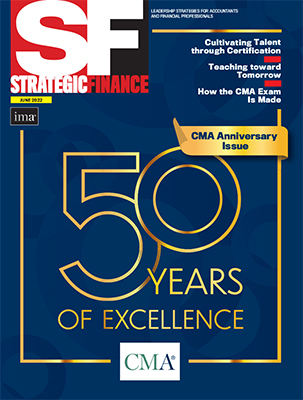Many global organizations are working on environmental, social, and governance (ESG) standards. As companies across the world embrace diversity, equity, and inclusion (DE&I), is it possible to have a global DE&I or “social” standard? How would it be reported? While some aspects of human capital reporting are easy to measure, such as employee demographics, one of the challenges in ESG reporting is the qualitative aspect of social standards and how to consistently report on those standards given the differences among businesses and investor need for comparable data. Can a globally comparable standard be developed?
Intangible assets, such as human capital, make up 90% of market value in the S&P 500. Human capital disclosures inform investors and other stakeholders about a company’s hiring trends and its investments in its employees and diversity programs (if any). Kris Russell, a senior manager in the ESG practice of Armanino LLP, says, “The global pandemic and recent energy security concerns have brought sustainability to the top of the business agenda. The essential step is integrating ESG into your strategic plan. Businesses that set ambitious sustainability goals mobilize the engagement of their teams and drive innovative solutions to solve the biggest challenges in our society.”
While there’s no single authoritative standard setter responsible for establishing a global standard, organizations are making progress toward ESG and human capital reporting.
ISSB
The International Financial Reporting Standards (IFRS) Foundation established the International Sustainability Standards Board (ISSB) in 2021. The ISSB aims to promote a “global baseline for high-quality sustainability disclosure standards to meet investors’ information needs.”
In March 2022, the ISSB released IFRS S1 for public comment by July 29, 2022. The proposed standard addresses general requirements for sustainability-related financial disclosures. And in April 2022, the ISSB announced the formation of a working group of jurisdictional representatives—consisting of members from China, the European Union (EU), Japan, and the United States—to establish dialogue for enhanced compatibility between the ISSB’s exposure drafts and ongoing jurisdictional initiatives on sustainability disclosures.
The ISSB will also create the Sustainability Standards Advisory Forum in 2022 to facilitate regular engagement with a broad set of jurisdictions. This development is a significant step toward international alignment of reporting requirements.
SEC
The U.S. Securities & Exchange Commission (SEC) plans to expand its disclosure requirements in 2022, which include but aren’t limited to proposed rules related to climate-related disclosures and ongoing monitoring, human capital disclosures, corporate board diversity, cybersecurity risk governance, and disclosures for special purpose acquisition companies; consideration of amendments to insider trading plan rules; and rules governing share repurchases.
The SEC proposed its climate-related disclosure rule on March 21, 2022, but rules related to the “S” of ESG seem to be lagging. SEC Chair Gary Gensler stated that the SEC will propose a rule in 2022 pursuant to disclosure enhancement about companies’ human capital management.
The SEC requires all public companies to disclose information that’s material to investors, which leaves a lot of discretion in determining “materiality.” Broadly, the content of reporting, such as units of measures and key performance indicators (KPIs), is subject to interpretation and may not be comparable among companies.
When it comes to employee demographics, the presence of employee engagement surveys, and employee retention, the public is reliant upon organizations’ voluntary disclosures in the absence of a consistent reporting standard. The SEC currently requires head count disclosure but lets companies apply subjective judgment on their disclosure of workforce information deemed material.
It’s more difficult for organizations to address standards regarding the social aspect of ESG given its complexity, uniqueness to a company’s culture, and nuanced geographical cultural aspects. Striking a balance between reporting data of interest to the investor community, telling a company’s story, and providing verifiable, objective data often prevents companies from disclosing human capital information. Measurability and comparability further complicate ESG reporting, specifically in the absence of common KPIs and the methodology for their reporting.
EFRAG
Progress regarding human capital reporting has been made by the European Financial Reporting Advisory Group (EFRAG). Established in 2021, EFRAG provides technical advice to the European Commission and functions as a coordinator of IFRS standards in the EU. In April 2022, EFRAG’s Project Task Force on European Sustainability Reporting Standards published European Sustainability Reporting Standard S1: Own Workforce General Standard (ESRS) for public consultation. The proposed standards provide stipulations on diversity and inclusion-related disclosure requirements, including:
- Material impacts on own workforce and types of workers affected. This disclosure focuses on providing equal opportunities and preventing any type of discrimination (based on gender, racial or ethnic origin, nationality, age, or sexual orientation, etc.). It also addresses elements such as access to secure employment, equal working conditions, and social protection.
- Policies related to own workforce. The disclosure requires companies to develop and implement relevant policies to address all the sustainability items mentioned in the previous stipulation.
The final draft of ESRS will be submitted to the European Commission by November 2022.
A GLOBAL MOVEMENT
It isn’t just the U.S. and countries in the EU that are actively pursuing ESG reporting. According to ESG Today, “Korea’s financial regulator, the Financial Services Commission (FSC) introduced plans for the Korea Exchange to require ESG reporting by all KOSPI [Korea Composite Stock Price Index]-listed firms…to promote responsible investing and improve information for investors…. Mandatory filing of ESG disclosure reports will begin for all KOSPI-listed companies in 2030.”
The Australian Accounting Standards Board (AASB) is also working on local standards for sustainability reporting in Australia. It presented two documents for public discussion. Stakeholders highlighted concerns regarding the broad nature of sustainability reporting and encouraged the AASB to consider international alignment in the development of local sustainability reporting standards. But there are no common international standards yet. The AASB has decided to use the ISSB standards as a starting point.
There is continued opportunity for convergence in the area of ESG reporting as it relates to DE&I. This remains an important yet challenging process. On the positive side, there’s increasing collaboration among different standard-setting bodies around the world, which creates solid ground for the development of global ESG reporting standards in the future.

June 2022



